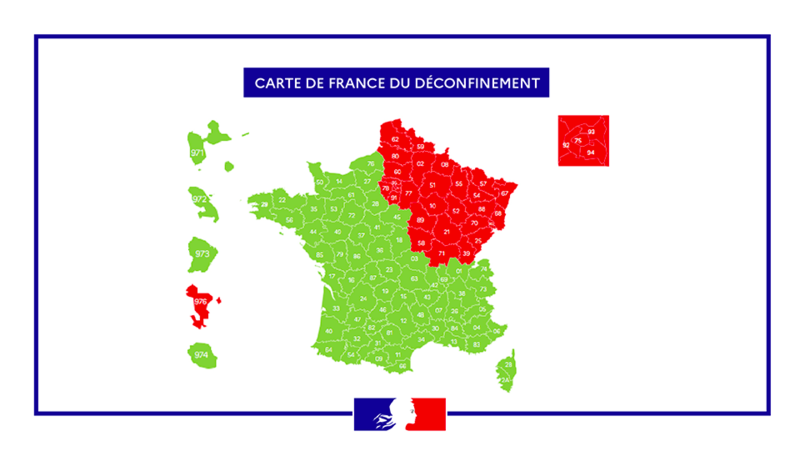Thessaloniki gets ready for its metro launch in November
The underground rapid transit lines have been under construction for almost two decades due to various project delays
 TheMayor.EU logo
TheMayor.EU logo At a press conference held on Thursday, the Prime Minister confirmed that the French de-escalation strategy is starting on 11 May
France is launching a new phase in its fight against coronavirus today. On 11 May starts a progressive process of the lifting of restrictions which will unfold within several weeks. This should allow the country to smoothly exit the lockdown that was first introduced on 17 March.
At a press conference held on Thursday, the French Prime Minister Édouard Philippe revealed the government’s strategy to alleviate the coronavirus restrictions. He underlined, however, that there are places in France which do not show significant progress in limiting the spread of Covid-19 and divided the country’s territory into red and green zones. Accordingly, the de-escalation process in the former will be slower.
 A map showing the plan to lift the lockdown in France, depending on the speed of the coronavirus spread and other factors. Image by the Government of France
A map showing the plan to lift the lockdown in France, depending on the speed of the coronavirus spread and other factors. Image by the Government of France
Naturally, the French capital and its surroundings belong to the red zones, where the number of cases remains higher than expected and therefore need extra vigilance. The same goes for the regions around Calais, Strasbourg and Dijon. In Ile-de-France large commercial centres also won’t reopen today.
In addition to the slower lockdown de-escalation, travellers on public transport of Paris in rush hours (6:30 – 9:30 and 16:00-19:00) will need a declaration signed by their employer. This should prevent crowding while giving priority to those who absolutely need to go to work via public transport.
As a major step of the de-escalation plan, since today 11 May, nurseries and primary schools and most businesses (including libraries, beauty salons, but not cafés, bars and restaurants) will reopen in both red and green zones. In the green zones, the reopening of secondary schools, cafés and restaurants appears possible from the beginning of June.
Starting today, the attendance of schools and nurseries will happen on a voluntary basis and with restricted groups size. The children of vital workers, such as healthcare personnel, will be given priority.
Also, from today, the elderly and the vulnerable are no longer required to stay at home but are advised to strictly observe social distancing.
For everyone above 11 years of age, face masks become mandatory on public transport, which will operate at half its capacity, informed the Ecological and Inclusive Transition Minister Elisabeth Borne.
According to estimations by Leigaro.fr, some 400,000 enterprises can reopen today. Combining this move with a return of thousands of children to their classrooms has been deemed far too risky of a move by many. Accordingly, it is yet to be seen whether the de-escalation strategy of the French government will continue as planned.

The underground rapid transit lines have been under construction for almost two decades due to various project delays

Now you can get your wine in Talence by paying directly in Bitcoin

That’s because the state has to spend money on updating the railway infrastructure rather than subsidizing the cost of the popular pass

Rethinking renewable energy sources for the urban landscape

The examples, compiled by Beyond Fossil Fuels, can inform and inspire communities and entrepreneurs that still feel trepidation at the prospect of energy transition

Now you can get your wine in Talence by paying directly in Bitcoin

The 10th European Conference on Sustainable Cities and Towns (ESCT) sets the stage for stronger cooperation between the EU, national and local level to fast track Europe's transition to climate neutrality.

At least, that’s the promise made by the mayor of Paris, Anne Hidalgo

The underground rapid transit lines have been under construction for almost two decades due to various project delays

At least, that’s the promise made by the mayor of Paris, Anne Hidalgo

Hostal de Pinós is located in the geographical centre of the autonomous region

Despite its church-y name, the district has long been known as the hangout spot for the artsy crowds

Urban dwellers across the EU are having a say in making their surroundings friendlier to people and the environment.

Forests in the EU can help green the European construction industry and bolster a continent-wide push for architectural improvements.

Apply by 10 November and do your part for the transformation of European public spaces

An interview with the Mayor of a Polish city that seeks to reinvent itself

An interview with the newly elected ICLEI President and Mayor of Malmö

A conversation with the Mayor of Lisbon about the spirit and dimensions of innovation present in the Portuguese capital














